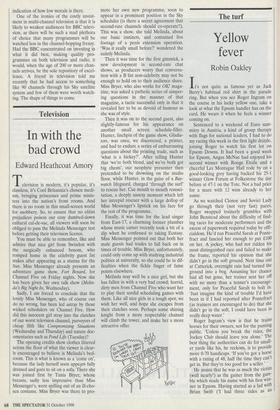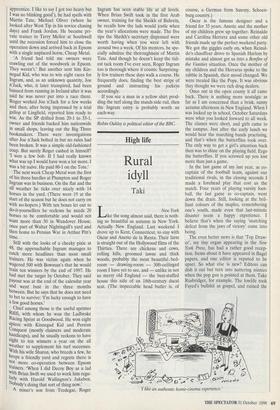The turf
Yellow fever
Robin Oakley
It's not quite as famous yet as Jack Berry's habitual red shirt in the parade ring. But when you see Roger Ingram on the course in his lucky yellow one, take a look at what the Epsom handler has on the card. He wears it when he feels a winner coming on.
Sentenced to a weekend of Euro sum- mitry in Austria, a kind of group therapy with flags for national leaders, I had to do my racing this week in the first light drizzle, joining Roger to watch his first lot on Epsom Downs. It had been a good week for Epsom, Angus McNae had enjoyed his second winner with Rouge Etoile and a cheerful Les Montague Hall rode by on a good-looking grey having backed his 25-1 winner Glow Forum at Folkestone the day before at 47-1 on the Tote. Not a bad price for a mare with 12 wins already to her name.
As we watched Clonoe and Soviet Lady go through their (not very fast) paces, Roger swapped trainerly grumbles with John Benstead about the difficulty of find- ing races for moderate performers and the excess of paperwork required today by offi- cialdom. He'd run Peaceful Sarah at Ponte- fract and fancied her enough to put £100 on her. A jockey, who had not ridden his most distinguished race and failed to make the frame, reported his opinion that she didn't go in the soft ground. Next time out at Catterick, overnight rain had turned the ground into a bog. Assuming her chance had all but gone, her trainer sent her off with no more than a tenner's encourage- ment, only for Peaceful Sarah to bolt in. `Just imagine the kind of trouble I'd have been in if I had reported after Pontefract (as trainers are encouraged to do) that she didn't go in the soft. I could have been in really deep water.' Roger Ingram's view is that he trains horses for their owners, not for the punting public. 'Unless you break the rules, the Jockey Club should leave you alone.' The best thing the authorities can do for small- er yards like his, he reckons, is to provide more 0-70 handicaps. 'If you've got a horse with a rating of 48, half the time they can't get in. But they're too good for a seller.' He insists that he was as much the victim (well nearly!) as the gainer from the gam- ble which made his name with his first win- ner in Epsom. Having started as a lad with Brian Swift CI had three rides as an apprentice. I like to say I got too heavy but I was no blinking good'), he had spells with Martin Tate, Michael Oliver (where he looked after West Tip in his novice chasing days) and Frank Jordan. He became pri- vate trainer to Terry Mellor at Southwell until the recession forced him to close the operation down and arrived back in Epsom with a single unplaced horse, Cheap Metal.
`A friend had told me owners were crawling out of the woodwork in Epsom. They weren't.' But another sent him Kin- negad Kid, who was to win eight races for Ingram, and, as an unknown quantity, Joe n'Jack, who, it later transpired, had been banned from running in Ireland after it was said he was never put into a race there. Roger worked Joe n'Jack for a few weeks and then, after being impressed by a trial gallop at Lingfield, reported him ready to win. As the SP drifted from 20-1 to 33-1, owner and friends backed him nationwide in small shops, leaving out the Big Three bookmakers. There were investigations after Joe n'Jack bolted in but no rules had been broken. It was a simple old-fashioned coup. But surely Roger cashed in himself? 'I won a few bob. If I had really known what was up I would have won a lot more. I was a bit naive. He paid 80-1 on the Tote.'
The next week Cheap Metal won the first of his three hurdles at Plumpton and Roger Ingram was in business. On the flat and the all weather he ticks over nicely with 14 horses in the yard. (There were 19 at the start of the season but he does not carry on with no-hopers.) With ten boxes let out to do-it-yourselfers he reckons he needs 20 horses to be comfortable and would not want more than 30 in Wendover House, once part of Walter Nightingall's yard and then home to Persian War in Arthur Pitt's time.
Still with the looks of a cheeky pixie at 48, the approachable Ingram manages to catch more headlines than most small trainers. He was victim again when he wagered 500 with Bowman's that he would train ten winners by the end of 1997. He had met the target by October. They said payout was at the end of the calendar year and went bust in the three months between. But he says that he does not need to bet to survive: 'I'm lucky enough to have a few good horses.'
Chief among those is the useful sprinter Rififi, with whom he won the Ladbroke Racing Sprint at Goodwood. He won eight apiece with Kinnegad Kid and Persian Conquest (mostly claimers and moderate handicaps), and he usually reckons to have eight to ten winners a year on the all weather to supplement his turf successes. With his wife Sharon, who breeds a few, he keeps a friendly yard and regrets there is not more co-operation between Epsom trainers. 'When I did Decoy Boy as a lad with Brian Swift we used to work him regu- larly with Harold Wallington's Jukebox. Nobody's doing that sort of thing now.' A miner's son from Tredegar, Roger Ingram has seen stable life at all levels. When Brian Swift took in the first Arab owner, training for the Sheikh of Bahrein, he recalls how the lads would jostle when the year's allocations were made. The five tips the Sheikh's secretary dispensed were worth having when you were left with around two a week. Of his mentors, he spe- cially admires the thoroughness of Martin Tate. And though he doesn't keep the tidi- est tack room I've ever seen, Roger Ingram too is thorough where it counts. Surprising- ly few trainers these days walk a course. He frequently does, finding the best strips of ground and instructing his jockeys accordingly.
If you see a man in a yellow shirt prod- ding the turf along the stands side rail, then the Ingram entry is probably worth an each-way.
Robin Oakley is political editor of the BBC.



















































































 Previous page
Previous page